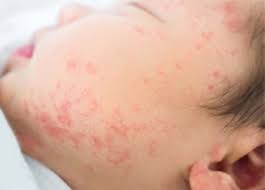For six years my son was allergic to cow's milk proteins (CMPA), an allergy that was diagnosed shortly after birth and that he spontaneously overcame. Unfortunately, throughout that time I lived through various situations that led me to publicly denounce on my social networks the lack of social awareness that allergic children often face.
But the comments and attitudes of the people not only sometimes had a selfish look, but on certain occasions, ignorance put my son's life or that of other children with the same condition at serious risk. This often happened when people confused CMA with lactose intolerance and even gluten intolerance, coming to think that it was the same thing.
But no. Allergy to cow's milk proteins, lactose intolerance and gluten intolerance have nothing to do with it. Each of these pathologies has its own peculiarities, and the needs of the children who suffer from them are very different.
1 Allergy to cow's milk proteins
It is one of the most common food allergies in children, as milk is one of the first foods they are exposed to. Cow's milk protein allergy (CMPA) is an abnormal reaction that occurs in the body when it comes into contact with milk proteins.
It is a reaction mediated by an immune mechanism, in which the body reacts to a substance that for most people is harmless. In the case of allergy to cow's milk proteins, we distinguish two types, depending on the mechanism by which the allergy occurs:
- mediated by immunoglobulin E (IgE): its reaction is very fast, almost immediately after drinking milk, and the main symptoms are skin reactions, respiratory symptoms, edema ... or even anaphylaxis and shock.
- not mediated by immunoglobulin E: symptoms are later, which makes diagnosis very difficult (stools with red blood, vomiting, diarrhea, little weight gain, constipation, gastroesophageal reflux, severe colic ...)
Either in the case of CMA mediated by IgE, as in the case of CMA not mediated by IgE, until the child reaches tolerance (fortunately it is an allergy with a very good cure prognosis) or the doctor decides otherwise, You must follow a diet free of milk, dairy products and derivatives.
2 Lactose intolerance
When some food is not assimilated by the body due to a digestive, enzymatic or metabolic deficiency, we speak of intolerance. Unlike allergies, in intolerances the immune system does not come into play.
Lactose intolerance occurs because the body is unable to digest the sugar in milk (lactose). It is the enzyme lactase, which is present in the small intestine, responsible for breaking down lactose into simpler sugars (glucose and galactose), so that they can be absorbed into the bloodstream.
When the activity of the enzyme is too low, lactose cannot be digested and passes into the large intestine, where it is fermented by bacteria in the intestinal flora. This can lead to intestinal symptoms such as flatulence, pain, and diarrhea.
Lactose intolerance can be primary (genetic) or secondary or acquired, which occurs when an illness, injury or surgery that affects the stomach temporarily makes it impossible to digest lactose, but over time the enzyme ends up recovering its function.
3 Gluten intolerance and celiac disease
Gluten is a protein found in wheat, rye, barley, triticale, spelled, and some varieties of oats, as well as their hybrids and derivatives.
There are people who have a gluten / wheat allergy, who are sensitive to gluten but celiac disease tests are negative, who are intolerant to gluten (the immune system is not involved), or who have celiac disease, an autoimmune disease (i.e. a response immune system against the body itself) caused by exposure to gluten proteins. Celiac disease is neither an allergy nor an intolerance to gluten.
If we talk about celiac disease in children, the diagnosis comes through a blood test that includes the detection of celiac disease antibodies, although on other occasions it might be necessary to perform a duodenal biopsy to confirm the diagnosis.
Celiac disease has no cure, but with an adequate gluten-free diet the symptoms disappear and with it the associated problems.
4 Therefore, milk proteins, lactose and gluten are different things.
When you have any of the described pathologies, it is important to read the product labeling carefully to avoid the substance to which you are allergic or intolerant. Although parents and relatives of children with any of these conditions are more than used to reading labels, it is true that when there is no one close to them who suffers from any of these conditions, some confusion can arise.
Not in vain, and as I mentioned at the beginning, there were several occasions in which someone offered my son allergic to milk a "lactose-free" or even "gluten-free" product, believing that by containing that legend it was of a product suitable for him. Nothing could be further from the truth.
That is why I believe that it is everyone's job to understand the most basic aspects of these and other pathologies that, if not treated correctly, could put the health or even the lives of children at risk. So in summary:
- Lactose intolerance is a condition in which the immune system does not come into play. It occurs when lactose is poorly absorbed by the body. In general, the symptoms are not serious, although they are very unpleasant and painful.
Children with lactose intolerance cannot consume products with lactose, but they can consume milk and derivatives as long as they ensure they are free of lactose. Some people can eat cheese and yogurts because they do not cause symptoms.
- As in any other food allergy, an allergy to cow's milk proteins involves the immune system, so if the child has a high degree of allergy, her life could be in danger if she comes into contact with this protein.
We should not call an allergy to cow's milk proteins 'intolerance to cow's milk proteins', as this can cause confusion and even downplay the pathology. When there is CMA, the person cannot consume dairy or derivatives (regardless of whether or not they contain lactose)
- In gluten intolerance there is an enzymatic deficit that does not allow gluten to be digested correctly. In this case, the immune system is not involved, as is the case with celiac disease. Therefore, we should not confuse both pathologies either.
People with gluten intolerance (and also celiac disease) cannot consume cereals with gluten or any other product that contains this protein. However, milk as such and its derivatives do not contain gluten by nature, so they could take it. In any case, it is important to always monitor the labeling of the products, because although by nature they do not contain gluten, in their manufacturing or packaging process they could have been contaminated with gluten and, therefore, they should also be discarded.






0 Comments